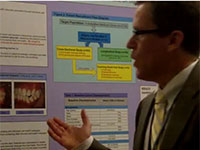Upcoming Workshop on HIV-associated Comorbidities, Co-infections, and Complications
Join this integrative event in person at NIH or via webinar on September 19-20
Psychological scientists interested in learning more about the state of the science on HIV, identifying research gaps, and recommending future integrative research priorities may be interested in attending an upcoming workshop hosted by the National Institutes of Health (NIH).
This workshop, titled “HIV-associated Comorbidities, Co-infections, and Complications,” will be hosted September 19-20, 2019 on the NIH campus in Bethesda, MD, and will also be accessible via webcast. The workshop will bring together experts from different fields to improve the health of people with HIV.
“People with HIV can now have nearly normal lifespans because of significant progress in HIV treatment, but the quality of their lives may be severely impacted by HIV-related comorbidities, co-infections, and complications,” says NIH. “The overlapping etiologies and consequences of HIV-associated diseases need to be better understood on a holistic level.”
According to NIH, to achieve these goals the workshop will combine presentations, facilitated discussions, and breakout sessions to:
- reach a shared understanding of the current state of the science and emerging HIV-related public health concerns
- identify research gaps
- develop a set of recommendations for future multidisciplinary research priorities
A link to the event’s agenda is available here.
Individuals interested in attending this workshop in person should register by September 6, 2019. More information about the webcast will be available closer to the event date.





APS regularly opens certain online articles for discussion on our website. Effective February 2021, you must be a logged-in APS member to post comments. By posting a comment, you agree to our Community Guidelines and the display of your profile information, including your name and affiliation. Any opinions, findings, conclusions, or recommendations present in article comments are those of the writers and do not necessarily reflect the views of APS or the article’s author. For more information, please see our Community Guidelines.
Please login with your APS account to comment.